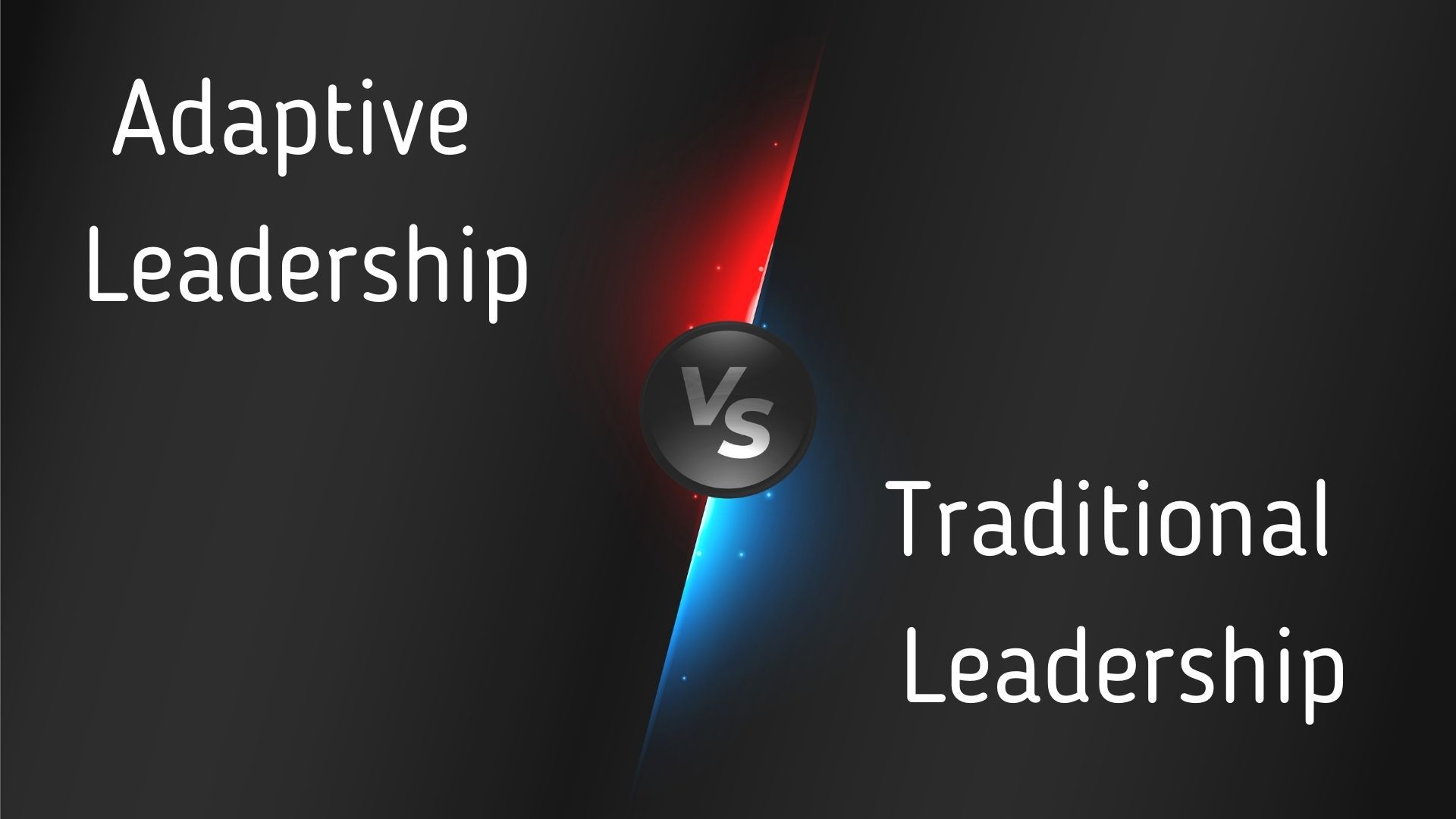Adaptive leadership is a practical leadership model which follows an adaptive approach in solving business problems by adapting to changing environments and responding to recurring problems. Successful adaptive leaders, businesses, or organizations use it as the act of influencing a group of people to handle challenges and emerge as winners.
In addition to addressing different issues, adaptive leadership is also useful in anticipating challenges and identifying their basic causes. Such leaders are also adept at finding out what adaptive challenge is worth handling and what to avoid to save time and resources.
Table of Contents
What is Adaptive leadership?
Definition – Adaptive leadership is defined as a practical leadership style that suggests leaders need to adapt and adjust to the changing environment in a manner that they can – “identify, focus and adapt” to the important aspects of a problem to solve it – and discard what is not important or avoidable.
This leadership framework was introduced by Ronald Heifetz and Marty Linsky. While talking about the importance of adaptive leadership skills, business professor Leon C. Megginson says-
According to Darwin’s Origin of Species, it is not the most intellectual of the species that survives; it is not the strongest that survives; but the species that survives is the one that is able best to adapt and adjust to the changing environment in which it finds itself.
The adaptive leadership style is well equipped to handle a wide variety of adaptive problems. An adaptive issue has no known answers or solutions to the problem, as they might have way too many solutions but no way to ascertain which one should be applied.
Adaptive leaders can influence individuals to proactively solve adaptive issues. Adaptive leadership has emerged as a popular leadership style, especially during the pandemic with unforeseen situations arising continuously, creating adaptive problems.
This type of leadership is different from traditional leadership because adaptive problems are different from technical or traditional problems. Let us understand their difference first-
Technical and Adaptive Problems
Technical problems have pre-determined responses that are already available. Such problems are generally mechanical and they can be solved by professionals.
While on the other hand, adaptive problems do not have any trained experts to deal with the problems at hand. Adaptive challenges or problems also do not have any fixed set of rules or procedures to address them.
4 A’s of adaptive leadership becomes useful in handling such problems-
4 A’s of Adaptive Leadership
As per the specific requirements of different adaptive challenges, 4 A’s of adaptive leadership comes into play- and they are-
- Anticipation- Adaptive leaders anticipate future needs, options, trends, etc.
- Articulation- Then leaders would articulate these needs to build collective understanding and support for action.
- Adaptation- They adapt to channelize continuous learning and the adjustment of responses as necessary.
- Accountability- Adaptive leaders are accountable for ensuring maximum transparency in decision making processes and openness to challenges and feedback.
Four Principles of Adaptive Leadership
The adaptive leadership philosophy is deeply rooted in the following four foundational principles.
1. Emotional Intelligence
Emotional intelligence is the ability of a person to understand, acknowledge, and perceive other’s emotions as well as their feelings. Adaptive leaders are sensitive to other’s emotions. They are empathetic leaders who focus on forming relationships with others based on trust. As a result, they can effectively boost the morale of individuals in the organization. This is mainly because such a leader creates an environment where everyone is heard and feels supported.
2. Organizational Justice
An adaptive leader follows an open-door policy of honesty and keeping lines of communication open and transparent. Another aspect of administrative justice is that such a leader shows genuine interest in the employees and answers their questions, concerns, and queries in earnest. Such a culture of equal treatment and sound justice is essential to implement adaptive changes. This is because employees perceive decisions made by such a leader as fair. If all facts are presented, and a culture of honesty is already created, then changes can easily be implemented.
3. Development
Adaptive leaders are innovative in their problem-solving approach and experiment using new strategies, processes, etc. They are not afraid of failure as they only learn what not to do from such an experience. They encourage their employees to reach their full potential by embracing creativity and determination.
4. Character
An adaptive leader has the same standard of judgment for themselves as they have for their team. They demonstrate a strong sense of ethical duty, responsibility, and morality. There is mutual respect and an environment that is open to constructive criticism. They stand by a code of ethics and principles.
The Practice of Adaptive Leadership in an Organization
Adaptive leadership is quite crucial for an organizational setup as it influences the ways teams overcome challenges and accomplish their goals. success.
Adaptive leaders get motivated by the adaptive challenges and in the process they keep on developing the adaptive culture in the organization.
Harvard Business Review Press publishes book – Practice of Adaptive Leadership: Tools and Tactics for Changing Your Organization and the World- written by Ronald A. Heifetz, Alexander Grashow, Marty Linsky that includes stories, diagrams, tools, cases, and worksheets to help leaders and managers develop their adaptive skills to take people outside their comfort zones and address the toughest of the challenges in today’s rapidly changing world.
The book also suggests the key traits of adaptive leaders, so let us have a look at that as well
Traits of Adaptive Leaders
Some of the key traits of leaders and managers with adaptive leadership skills are-
- Skills to link organizational change to the primary values, dreams, and abilities of the involved stakeholders
- Ability to create an environment that can embrace the diversity of views and take benefit of such collective knowledge to benefit the organization
- Ability to understand that change can be a painful process and therefore they have the skills to foresee and counteract any reluctant behavior from teammates
- The power of acceptance to understand that large-scale change is a gradual process that demands persistence and has the willingness to bear the pressure that comes during the process
- Ability to be proactive, look for opportunities and invest the needed resources to go after them
- Ability to accept when they make mistakes and change or abandon non-productive strategies
- Being open to experimentation and risk-taking
- Leadership skills to like and encourage innovation among team members or employees
Advantages of Adaptive leadership
The following are the pros of adaptive leadership:
1. Embraces Change
Given that no organization can avoid or be immune to changes, adaptive leadership is prepared to face anything. They are not set in their ways as they know that they work in a dynamic environment and have to expect changes.
2. Higher Inclusivity in the decision-making process
An adaptive leader listens and considers multiple opinions before taking any action. This is because out-of-the-box solutions are at times needed to solve problems, and a leader recognizes the strengths of its employees. As a result, the leader encourages creative thinking and considers the ideas of different employees.
3. Rules are meant to be broken
An adaptive leader does not pay that much attention to following rules as they know that change is the only constant. The inevitability of change makes them question the permanence of rules. Rules may need to be rewritten to accommodate changing situations. Clinging to previously laid out policy and procedures during a period of change is something alien to an adaptive leader.
4. Effectively use the strengths of people
Adaptive leaders know how to utilize the strengths of various employees within a team. They work towards bringing out the best quality of different people by placing them in positions that encourage such qualities.
Disadvantages of Adaptive Leadership?
The following are the cons of adaptive leadership
1. Hasty decision-making is possible
It is difficult to maintain a swift response and a hasty response. An innovative approach may incorrectly be labeled as a failed attempt without giving it an appropriate time to be effective and work out. A mindful yet timely decision needs to be made. At times, a leader may rush in taking a decision and make a wrong or disadvantageous decision.
2. Limited Honesty
Organizational justice may be one of the foundational principles of adaptive leadership, but sometimes leaders must withhold certain information from their employees. The reason for this may vary with the given circumstance, but the leader cannot afford to share all information. Striking a balance between sharing appropriate information and withholding information at times is not struck. This leads to graver problems.
Four Dimensions of Adaptive Leadership
Leaders adaptive focus on the following four dimensions to better prepare for unforeseen business environments.
1. Navigating Business Environment:
An adaptive leader embraces uncertainty and proactively works towards continuous problem-solving. They focus on learning from their mistakes and changes to find the best possible solution to their unique problems. This allows them to navigate such a dynamic business environment.
2. Leading with Empathy:
Such leaders have a high EQ and foster strong bonds with their employees. They respond and lead with empathy and can effectively recognize the emotions of others.
3. Learning via self-correction and reflection:
An adaptive leader learns through experimentation. An experiment may be a success or failure, and if it is the latter, then they learn from their mistakes through self-correction and reflection.
4. Creating win-win solutions:
An adaptive leader values cooperation and encourages the active involvement of others in regular business affairs. Their focus is broader than just revenue, profits, and margins. This helps them come up with win-win solutions for all parties involved.
Adaptive Challenges during Adaptive Leadership
As adaptive leadership revolves around experimenting, finding out new knowledge, and making different adjustments, it has to face different challenges in the process. Adaptive leadership works by shifting values, perceptions, and beliefs that might go through the following challenges-
- Senior executives might be reluctant to let go of their old tactics and policies for adapting to the new ways and changes suggested by adaptive leaders
- Another form of adaptive challenge that might take place is the occurrence of different forms of resistance like diverting, marginalizing, and attacking from employees, clients, or stakeholders
- The unwillingness of leaders in listening to the opinions and recommendations of other people, clients, or coworkers is also one of the common challenges of adaptive leadership
For overcoming these challenges, it is important to understand that adaptive leadership is more about teamwork than power and therefore leaders should be willing to listen and adapt to the suggestions given by others. Listening to other’s recommendations is not about abandoning self-goals instead, it widens one’s horizons and optimizes the execution of adaptation and changes.
Adaptive Leadership Examples
Some of the popular real-life examples of adaptive leaders are-
1. Abraham Lincoln
One of the most popular leaders with adaptive leadership style has been Abraham Lincoln who had accepted diversity by appointing rivals for his cabinet. He was also open to criticism as well as debate. He was popularly known as honest abe and he used an open-door policy to invite citizens to discuss their challenges with him. His adaptive skills, an attentive ear, and inherent empathy enabled him to earn respect as a leader adaptive.
2. General George Patton
A general in the United States Army who commanded the Seventh United States Army, General George Patton is also known for his adaptive style of leadership. Because of his adaptive leadership, he gained lots of respect as a military leader because he used to solicit input from his team. He was also quite good at anticipating trouble and having a backup plan for demanding situations.
Here is a video by Marketing91 on Adaptive Leadership.
Adaptive Leadership vs. Traditional Leadership
Adaptive leadership revolves around focusing on leadership as a practice rather than as a position.
An adaptive leader thinks that situations continuously evolve, and accordingly, innovation and flexibility should be used. Let us understand how adaptive leadership is different from traditional leadership-
- In adaptive leadership, job-duties of the employees stay broad-based that offers flexibility while on the other hand, in traditional style, detailed and ironclad job-duty-lists are used
- In an adaptive style, different roles in an organization are fluidic while the traditional method has static job duties for the employees
- Adaptive leadership comprises open communications in which members are encouraged to have their network, while the traditional method involves controlled communication in a top-down organizational style
- Adaptive styles comprise policies that encourage members to innovate and find solutions, but traditional leadership offers strict guidelines for employees
- Adaptive leadership has temporary and fluid organizational structures while traditional leadership has bureaucratic and regimented departments
Characteristics of a good AdaptiveLeader
The following section of the article gives all the characteristics of good and successful adaptive leaders. These traits are well observed in them that lead to maintaining the effective rate of an organization.
The characteristics are as follows:
- The leaders can link up all primary values for the organization. They are adapted to navigating all business environments.
- Adaptive leaders can create an environment that includes all types of diversified views. They encourage diversity in thoughts from the fellow members.
- All adaptive leaders possess empathy for their employees and organization for creating a good environment.
- They understand that change is a painful process. It should be adapted mindfully to get it right.
- The leaders remain proactive always. They tend to be in this state all the time.
- Adaptive leaders always learn new things to adapt to the new coming scenarios for the business field.
- They always have a good vision for the business environment.
- They inspire all employees through their actions and nature.
Conclusion!
On the concluding note, it is clear that leadership adaptive is effective in ensuring evidence-based learning and adaptation along with strengthening transparency, inclusion, and accountability to mobilize collective action and optimize the result-driven adaptation.
What are your thoughts about the effectiveness of adaptive leadership style in today’s business world?
Liked this post? Check out the complete series on Leadership


